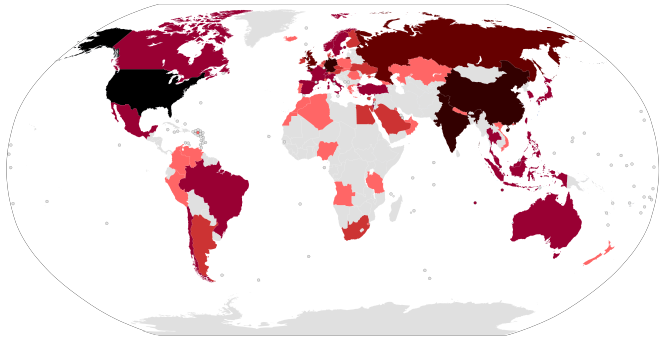Does it depend on whose side the billionaires align? Actually no, Alexandria Ocasio-Cortez tells the audience at this Martin Luther King Day forum yesterday evening. The billionaires themselves may not be immoral, the new Congresswoman from New York declares, but the system that allows them to exist has to be.
Don’t be too quick to discard this as another data point on AOC’s maladroit track record:
.@AOC says it's "immoral" that the American economic system "allows billionaires to exist." pic.twitter.com/Y8uGj5BJXd
— Tom Elliott (@tomselliott) January 22, 2019
“I don’t think that necessarily means that all billionaires are immoral,” she added. “It’s not to say someone like Bill Gates or Warren Buffet are immoral people. I don’t believe that.” …
“I do think that a system that allows billionaires to exist when there are parts of Alabama where people are still getting ringworm because they don’t have access to public health is wrong,” Ocasio-Cortez said.
Ocasio-Cortez isn’t altogether wrong on this point, even if she does go off the rails a bit when claiming that corporations like Wal-Mart and Amazon pay employees “less than a minimum wage,” while “essentially” getting the government to transfer wealth to them. Both companies pay above the minimum wage — in fact, both companies raised their base pay last year after the tax-reform bill went into effect. (To be fair, she may have gotten “minimum wage” confused with “living wage,” which she had just mentioned.) As far as wealth transfers, both companies and lots of others benefit from state and local deals to locate their facilities within their jurisdictions, which certainly is frustrating for level-playing-field advocates, but at least ostensibly that also provides jobs in those communities, too.
Otherwise, though, Ocasio-Cortez is basically stating a premise that most Christians would hear in church — that the gross hoarding of wealth violates the self-sacrificing love that should exist among God’s children in terms of overall distribution of Creation’s bounty intended for all. Calling the system “immoral” might be a bit hyperbolic, but many people would at least agree that recent outcomes of our economic system have become imbalanced, if not warped. The problem isn’t capitalism itself but in our lack of effort to enforce anti-trust laws to keep wealth — and therefore political power — accruing into fewer and fewer hands. That trend has accelerated the rise of populism on both sides of the ideological divide and corroded confidence in our public institutions, as I wrote in my column at The Week:
Plenty has been written about the rise of the populist right and its focus on borders and immigration, which both preceded and mirror those same concerns in Europe. Donald Trump captured that impulse long before Bannon joined his presidential campaign, appealing to those who have felt ignored over those issues by the conglomerated governing classes in Washington. He also appealed to those who have lost out in globalization and whose needs and concerns were dismissed by institutions and both parties who celebrated the victories of that globalization without doing much to mitigate the pain it caused or to protect against abusive trade practices.
However, left-wing populists have also emerged and might even be ascendant at the moment. Bernie Sanders went from a back-bench crank to nearly grab the presidential nomination of the Democratic Party. D’Ambrosio’s oversight shortchanges the real concerns that drive populism on the other side of the ideological aisle — some of which overlap with those on the right, including deep suspicion of global markets and the people who benefit by them. Decades of consolidation by mergers and acquisitions in every industry have pushed more wealth and power into fewer and fewer hands. Rather than have existing institutions and those governing them check that trend, the people increasingly believe that all the consolidated money and power has warped the institutions into legal and political cover for a small group of beneficiaries.
The 2016 election cycle showed the result of those institutional failures. Americans elected someone who would act against those institutions to deliver populist justice, and nearly had both major-party candidates for options. The corrosion of the legislative process both fuels and highlights this problem. Congress isn’t interested in compromise because voters aren’t interested in it. And that’s because compromise has become a catch-word for the status quo of disconnection and inauthenticity.
This is how we got Trump, and it’s how we got Bernie Sanders and Ocasio-Cortez, too. The solutions championed by all three have mainly been to manipulate tax policy to the benefit of their preferred constituencies. We would be far better off pursuing a more aggressive anti-trust policy in the financial and tech markets especially, flattening and paring the tax code to prevent future rent-seeking behaviors, and therefore rebalancing both the wealth and political power in the US to a more even distribution. That would help rebuild confidence in our public institutions and greatly weaken the impulse for populist strongmen to work around them.
Will we get there? Not with Ocasio-Cortez’ solutions, but that doesn’t mean she’s not correct to some extent about the problem itself. And until we recognize the problem and start to correct it, her top-down socialist policies will sound better and better to more and more American voters, even though they would only make the problem exponentially worse.

